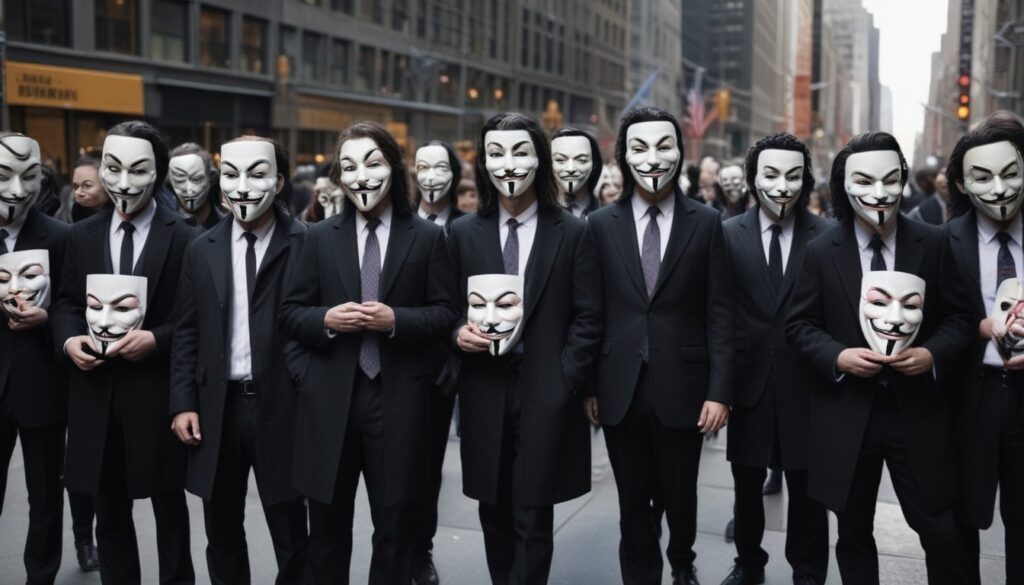Anonymous is one of the most well-known yet enigmatic entities in the digital age. This decentralized international hacktivist collective has made headlines for its cyber-attacks, protests, and efforts to expose corruption. Despite the group’s high-profile actions, much about Anonymous remains shrouded in mystery. This article aims to provide a simple and comprehensive overview of who Anonymous is and the history of the collective.

Origins of Anonymous
Anonymous originated in the early 2000s on the imageboard 4chan, a site known for its freewheeling and often controversial content. Users of 4chan would frequently post as “Anonymous,” a default username that allowed for anonymity. This collective anonymity became a hallmark of the site’s culture and eventually the basis for the Anonymous movement.
The first notable action attributed to Anonymous occurred in 2006, when members organized a coordinated attack against the social networking site Habbo Hotel. This involved creating avatars dressed in black suits and forming virtual blockades to protest what they perceived as arbitrary moderation practices.
Early Actions and Ideals
Anonymous began to coalesce around shared ideals of internet freedom, freedom of speech, and opposition to censorship and surveillance. These principles guided their early actions and continue to influence their operations today.
In 2008, Anonymous gained significant attention with its campaign against the Church of Scientology. Known as Project Chanology, this campaign involved a series of protests, pranks, and cyber-attacks aimed at exposing the Church’s practices. The campaign marked a shift from prankster activities to more serious political activism.
Evolution into Hacktivism
As Anonymous grew, so did its scope of operations. The group began to engage in hacktivism, a blend of hacking and activism, targeting entities they deemed corrupt or oppressive.
-
Operation Payback (2010): Anonymous launched a series of DDoS (Distributed Denial of Service) attacks against organizations perceived to be anti-piracy, including the Motion Picture Association of America (MPAA) and Recording Industry Association of America (RIAA). This operation highlighted their stance against censorship and digital rights infringement.
-
Arab Spring (2011): Anonymous played a role in the Arab Spring uprisings, particularly in Tunisia and Egypt. They supported activists by providing resources for communication, organizing cyber-attacks against government websites, and spreading information about the protests.
-
Operation Darknet (2011): The group targeted websites hosting child pornography, taking down several sites and exposing user data to authorities.
Major Campaigns and Operations
Anonymous’s influence and activities continued to grow, leading to several high-profile campaigns:
-
Occupy Wall Street (2011): Anonymous supported the Occupy Wall Street movement, which protested economic inequality and corporate influence in politics. They helped organize protests, spread information, and conducted cyber-attacks on financial institutions.
-
Steubenville Rape Case (2012-2013): Anonymous intervened in the Steubenville, Ohio rape case by exposing evidence and individuals involved in the cover-up of the assault of a teenage girl. This action brought national attention to the case and the issue of sexual violence.
-
Ferguson Protests (2014): Following the shooting of Michael Brown in Ferguson, Missouri, Anonymous supported the protests against police brutality. They launched cyber-attacks on police websites, released information about the police involved, and helped spread awareness about the protests.
Anonymous Today
Anonymous remains active today, although the decentralized nature of the group means that its operations are sporadic and varied. The group’s actions are driven by individual members or smaller factions within the collective, often operating independently of one another.
-
Black Lives Matter (2020): During the global protests sparked by the murder of George Floyd, Anonymous resurfaced with cyber-attacks on police departments, leaking sensitive information and amplifying the message of the Black Lives Matter movement.
-
COVID-19 Pandemic (2020-2021): Anonymous targeted governments and organizations they believed were mishandling the pandemic. They conducted cyber-attacks on the World Health Organization (WHO) and exposed government documents to highlight discrepancies in handling the crisis.
-
2024 U.S. Presidential Election: As the 2024 election approaches, Anonymous is expected to remain vigilant against perceived threats to democracy and freedom. Their involvement may include cyber-attacks, information dissemination, and support for protests.
Conclusion
Anonymous is a unique and influential entity in the digital world. Its decentralized nature, commitment to anonymity, and focus on activism against oppression and corruption have made it a powerful force for change. Despite the lack of formal structure, Anonymous has managed to influence global events and bring attention to critical issues. As technology and society evolve, so too will the actions and impact of Anonymous, continuing to challenge the status quo in unpredictable ways.